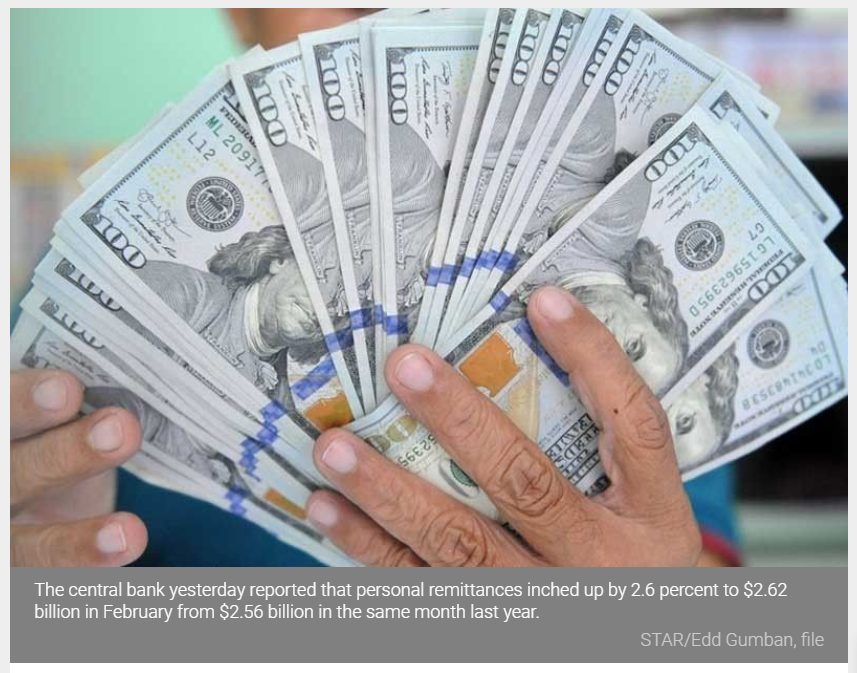Philippines: Remittances fall to 8 month low
BSP still confident of full-year growth
MANILA, Philippines — Remittances from overseas Filipino workers (OFWs) fell to their lowest level in eight months last February, but the Bangko Sentral ng Pilipinas (BSP) remains confident of positive growth this year amid the coronavirus disease 2019 or COVID-19 pandemic.
The central bank yesterday reported that personal remittances inched up by 2.6 percent to $2.62 billion in February from $2.56 billion in the same month last year.
This was the smallest since personal remittances, consisting of cash and non-cash items that flow through both formal or via electronic wire and informal channels such as money or goods carried across borders, amounted to $2.54 billion in June last year
BSP said personal remittances went up by five percent to $5.57 billion in the first two months of the year from $5.3 billion in the same period last year as the amount sent home by land-based workers with work contracts of one year or more grew by 3.5 percent to $2 billion, while the amount from sea-based and land-based workers with work contracts of less than one year slipped by 0.9 percent to $560 million.
Likewise, BSP said cash remittances coursed through banks increased by 2.5 percent to $2.36 billion in February from $2.3 billion in the same month last year. This was the smallest level since the $2.29 billion recorded last June.
For the first two months of the year, cash remittances increased by 4.6 percent to $5 billion from $4.78 billion in the same period last year.
The BSP said the US registered the highest share of overall remittances at 39 percent, followed by Singapore, Japan, Saudi Arabia, the United Kingdom, United Arab Emirates, Qatar, Canada, Hong Kong and Korea.
Global credit watchdog Fitch Ratings earlier said OFW remittances would likely contract by 2.5 percent this year, ending 18 years of growth, amid job losses, falling income and severely restricted deployment of new workers abroad.
However, BSP Governor Benjamin Diokno said foreign exchange inflows from OFWs would remain robust and grow by two percent instead of the original three percent target despite the health crisis.
“As you know, the government has now allowed Filipino overseas workers to leave the country, except health workers who are most needed at home,” the BSP chief said.
Diokno added authorities now expect remittances to contract by 0.2 to 0.8 percent from the original three percent growth target due to the emergence of the global health crisis.
“To be on the conservative side, BSP adopted an amended forecast of two percent, which is less than 2.5 percent. That’s BSP’s latest forecast,” Diokno clarified.
Diokno said the central bank would continue to closely monitor the level of remittances sent by OFWs in addition to other inflows of foreign currencies.
Robert Dan Roces, chief economist at Security Bank, said OFW remittances have proven resilient in past downturns.
“While we all hope for a positive growth, remittances this time may contract year-on-year as the hospitality and cruise ship components being the hardest hit might pull down remittance levels,” Roces said.
The Department of Foreign Affairs (DFA) recently reported close to 20,000 OFWs comprising mainly of seafarers from 75 cruise ships have been repatriated to the Philippines due to the COVID-19 pandemic.
“A faster redeployment as some economies open up could yet turnaround the contraction we are currently seeing,” Roces added.
UnionBank chief economist Ruben Carlo Asuncion expects a potential decline in OFW remittances this year as COVID-19 covers more host countries.
Asuncion pointed out the severe acute respiratory syndrome (SARs) outbreak resulted to an average of 18 percent drop in remittance inflows from affected countries particularly Hong Kong, Singapore, Taiwan and Canada in 2003.
“I am expecting more of a decline rather than an increase. The tourist-related overseas Filipino jobs are just obvious examples of how the impact on remittances inflows may pan out this 2020,” Asuncion said.
Source: https://www.philstar.com/business/2020/05/16/2014263/remittances-fall-8-month-low


 English
English




